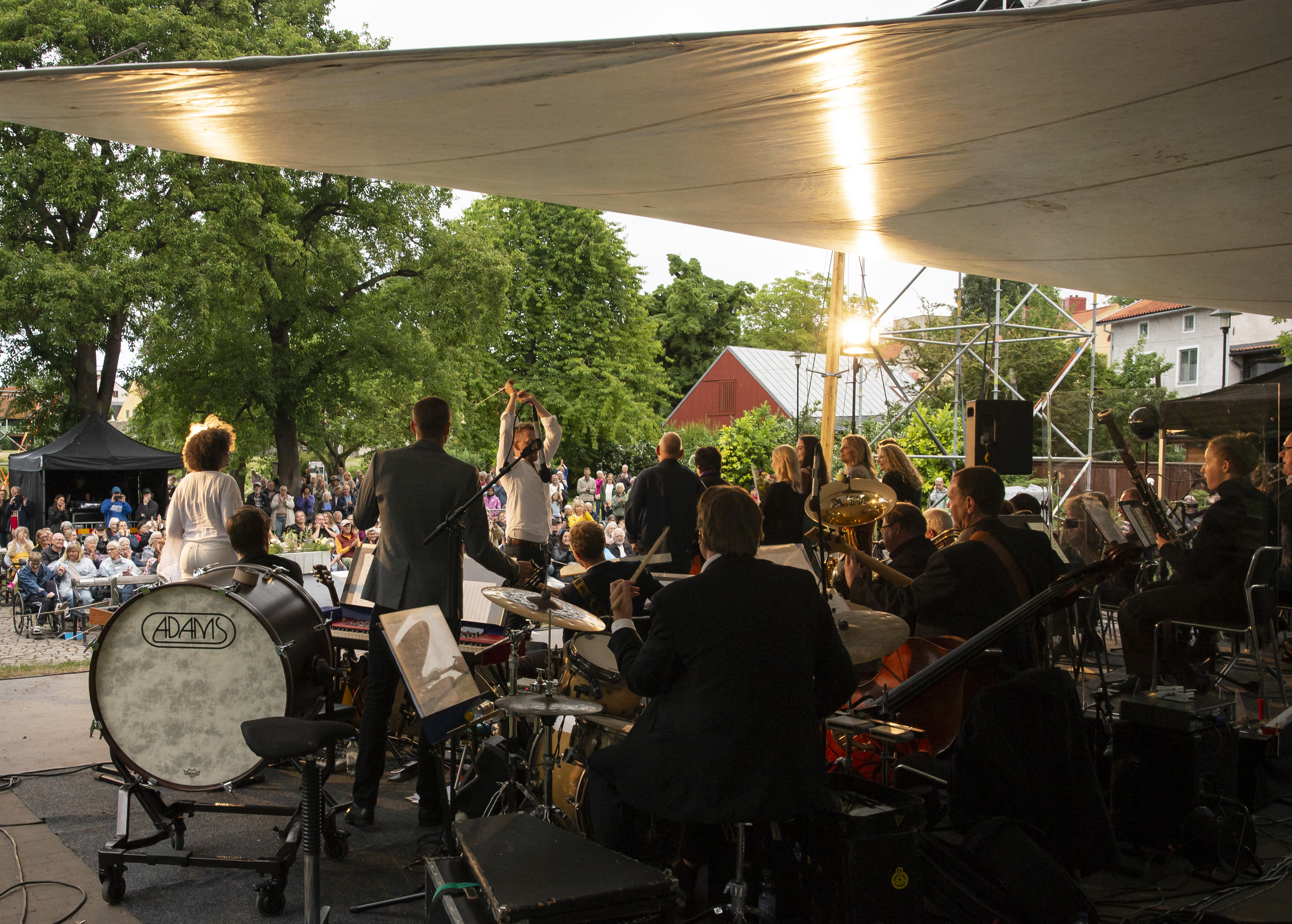GotlandsMusiken was established in 1988 and is headed by Gotland's Regional Council. Our aim as a regional music institution is to conduct musical activities and be a central figure in Gotland's musical life with the watchwords nearness, openness and tradition.
Who we are and our mission
Gotland's Musikstiftelse, more commonly known as GotlandsMusiken, was established in 1988 and is headed by Gotland's Regional Council. Our aim as a regional music institution is to conduct musical activities and be a central figure in Gotland's musical life with the watchwords nearness, openness and tradition.
Most people probably know GotlandsMusiken as a wind orchestra, but we are much more than that. We thrive in working to create a vibrant musical life and to provide a rich range of concerts over the whole of Gotland, all year round. We produce and arrange concerts, whilst also supporting, inspiring and collaborating with the island's musical life and its inhabitants.
We collaborate with, and complement, both the commercial, the free and the non-profit musical life and place special emphasis on areas such as children and young people in our activities. We also work particularly to support the music genres that are less successful commercially on the island, such as classical and jazz. At the same time, we protect the spread and survival of traditional wind music.
Despite the fact that Gotland is Sweden's smallest region with relatively few year-round residents, and the municipality with the second largest population in what is classified as a sparsely populated area, we provide a fantastically rich, varied and high-quality offering of music and strive to continue to be a strong contributing force. We are proud to be the island's professional musical base resource with our 14 employed musicians who complement the local musical life through their creativity and accessibility.
GotlandsMusiken receives both state and regional grants through the KulturSamverkansModell to conduct professional music activities on Gotland in accordance with the national cultural policy goals and in harmony with Region Gotland's cultural plan. GotlandsMusiken's operating grant is paid out and administered by the Culture and Leisure Administration and the Swedish Cultural Council.
Our work
Our regional music mission includes concerts in schools and healthcare as well as public concerts in libraries and in our concert series. In addition to this, we do a number of collaborative projects with, for example, the local theatre (Länsteatern), the composers school (Tonsättarskolan in Visby) and the Culture School on Gotland. In total, approx. 340 concerts and activities are held per year for roughly 30,000 people. As accessibility and proximity are important to us, the goal is to have an even distribution between events in Visby and in the countryside. As an example, the division in 2019 was: 51% on Gotland outside Visby, 44% in Visby and 5% on the mainland or abroad.
GotlandsMusiken's musicians and ensembles are organised so that the institution can offer a wide range of genres and thus a large, high quality and varied selection of music. The breadth also opens up innovative and genre-crossing projects, not infrequently in collaboration with local actors. Our 14 employed musicians work both individually, in smaller ensembles and together in our wind orchestra. Some employees also have combined duties as both musicians and producers.
GotlandsMusiken has its rehearsal, staff and administrative premises in Vibble, south of Visby. In addition to the musicians, GotlandsMusiken's director, economist, clerk, sound technician/caretaker, PR communicator and producers work there.

History
The history of GotlandsMusiken goes back to the national conscription in 1838, with the realisation of the need for a defence presence on Gotland. From 1845, the military build-up on the island also included a number of musicians for signalling, which eventually became a larger military orchestra.
In 1973, the orchestra became part of the state regional music and was thus given both a military and civilian mission. At that time, the Visby Big Band was also started, which had its first public appearance in 1974. The big band, which today has changed its name to the Gotland Big Band, was at the time of its formation the only state-supported big band in regional music and toured extensively both in Sweden and abroad under the leadership of musical director Olle Linden. In 1988 the Gotlands Musikstiftelse was established as a completely civilian organisation and ownership taken over by the municipality of Gotland. The organisation continued to receive significant government grants. The new statutes clarified the purpose of the foundation:
"The purpose of the institition is to conduct music activities. Gotland's Musikstiftelse shall thereby be a supporting, initiating and complementary institution for Gotland's musical life".
In 1988 GotlandsMusiken employed 26 musicians, 22 of which were full-time. Unlike many other regional music organisations that were formed this year, the wind orchestra was kept as the starting point for the activities. A part-time string quartet was also added. The purpose of this was to have the opportunity to develop the wind music tradition whilst at the same time providing ceremonial music for the military. By dividing the orchestra into smaller groups, music could be performed in a variety of ensemble forms; wind quintet, saxophone quartet, brass ensemble and jazz ensemble, in addition to the big band.
2001 became the starting point for the popular concert series which have since become a cornerstone of the institution's public activities. In 2004, the army regiment P18 on Gotland was disbanded and thus GotlandsMusiken's formal connection to the military disappeared. However since then, with the building of the new Gotland regiment, cooperation has slowly picked up again, mainly in ceremonial contexts. In 2009, the Swedish parliament decided on new national cultural policy goals, which included, among other things, that professional culture should be present in all regions of the country. As a tool for this, the so-called KulturSamverkansModellen was introduced in 2011, where the state and the respective region agree on shared funding based on the regional cultural plans, under which GotlandsMusiken operates today.